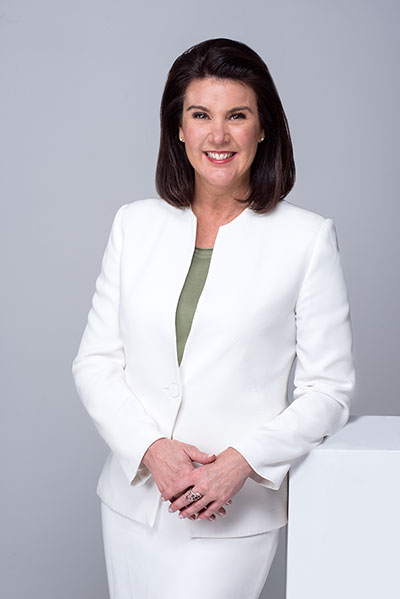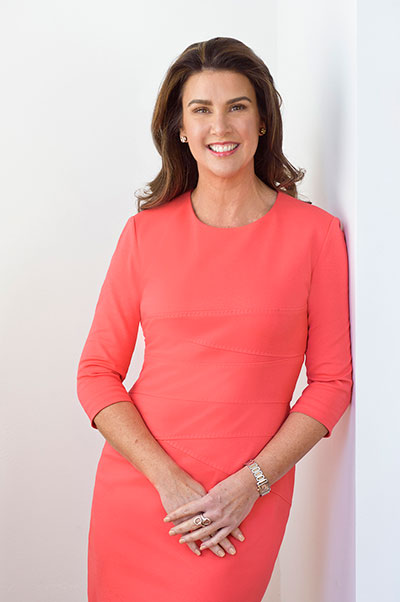When Jane Hume worked as a senior policy advisor at AustralianSuper, she appeared at Parliament House, Canberra, representing the industry fund giant before the Senate Economics Committee.
Ironically, less than five years later, Hume presided over proceedings as Chair of that very same Committee.
The elevation highlights how Hume, after being elected to the Senate and appointed Assistant Minister for Superannuation, has had a swift rise in politics in a relatively short space of time.
But despite that recent hop from super to politics, Hume is far from being captive to the industry.
All roads lead to increasing member engagement
Hume’s appointment as Assistant Minister comes at a vital time for the industry, which has undergone many changes, but now faces a fresh set of reports and inquiries, including the review into Australia’s retirement income system, the Retirement Income Review, which some worry will lead to the freeze of legislated rises in the Super Guarantee.
Hume reaffirms the Government’s commitment to the SG rises, but says she wants to continue to drive reform and efficiencies across the entire industry. “It’s a system we should be really proud of,” she says. “At the same time, it’s not a perfect one. It’s our responsibility to do as much as we can to make it as perfect as possible.”
It’s a system we should be really proud of,” she says. “At the same time, it’s not a perfect one. It’s our responsibility to do as much as we can to make it as perfect as possible.
Hume wants the industry to cut fees, improve insurance, and rationalise underperforming funds. The Government is also actively considering a new default mechanism. But above all, Hume wants to get Australians more engaged with their super.
“The biggest indicator of success would be a working population whose engagement with their superannuation has increased dramatically,” she says. “A population that takes an active role and interest in the outcomes they are generating from nearly $1 in every $10 they give up and put away for their retirement.”
A career detour via business investment
Hume grew up in Melbourne and completed a Commerce degree at the University of Melbourne. She wanted to be an accountant and planned to join one of the big accounting firms as a cadet after she graduated.
But Keating’s ‘recession we had to have’ in the early 1990s meant cadetships evaporated. So Hume joined her father’s private brokerage company, which valued companies between $10 million and $60 million and introduced buyers and sellers, as an analyst. “That was an amazing experience,” she says. “I immersed myself in it and stayed longer than anticipated.”
After a stint travelling overseas, she joined National Australia Asset Management (NAFM)’s division that looked after financial advice, working with the CEO as an analyst. The division was rolled into NAB proper, and she became an investment research manager, putting together the approved product list for all NAB financial planners.
“That was the first time I was immersed in the investment side of the business,” she says. “I loved doing that. That was terrific fun.”
Hume then tried private banking, but didn’t enjoy it, and she moved into asset management when Rothschild recruited her as a key account manager.
Veering off on the path to politics
It was during her six years of maternity leave that she completed a Graduate Diploma Arts, majoring in Political Science at Melbourne University.
Hume had been active in politics as a member of the Liberal Party, running campaigns. She had also built a program to mentor young women keen on entering politics, which was based on similar programs at the Australian Institute of Company Directors (AICD) and NAB.
“I thought politics was something I was interested in, but I never intended it as a career,” she says. “Politics was a bit of a slow burn for me.”
Hume says she wasn’t part of the ‘student politics set’ at Melbourne University; she found student politics to be strident and angry. “I was always a happy student. I majored in ‘beers and boys’, certainly not politics.”
While on maternity leave, she had also begun to broaden her work beyond finance, taking on non-executive directorships at the Royal Children’s Hospital and Federation Square.
Hume’s re-entry into work and banking coincided with the global financial crisis. The day she joined Deutsche Bank’s asset management division as a vice president, Lehman Brothers collapsed. She didn’t last long there, but crossed paths with Treasurer, Josh Frydenberg, then a director of global banking at Deutsche.
After a year in Sydney, she joined AustralianSuper as a policy advisor. “It was the first time I had worked in the policy side of business as opposed to investment side; and the first time I worked in industry funds management rather than retail. It was a real exposure.”
Different sectors, but the same destination
Hume is a rare parliamentarian: not only does she have superannuation experience, but she has experience in both the industry and retail sectors.
Hume says that, of the sectors within financial services, super in particular “is possibly the most partisan, which is very frustrating”.
“When it all comes down to it, there is so much more that unites the sector than divides it,” she adds. “We can all agree the most important thing is getting the best outcome for members. While each sector has a different idea about doing that, the intentions are the same and noble.”
Hume has a clear message for the industry: she is ‘not a culture warrior’. She says there is a real opportunity to work together, “whether they be industry, retail, self-managed or corporate”.
In 2015, a Victorian Federal senate seat became available and Hume was asked to run. One of her key selling points during preselection was her experience in superannuation.
“I highlighted it as something that I could bring to Canberra that was different from my competitors,” she says. “When you have a $2.9 trillion industry, it’s nice to have someone in there who has worked in it and understands it.”
Hume wanted to make an impact in superannuation when she was elected Senator. “Absolutely from day one,” she says.
Growing the system and upping engagement
After the Federal election in 2019 Hume was appointed Assistant Minister for Superannuation.
She says the industry should be proud of its origins, growth and what it has achieved.
But she says that, as the Productivity Commission’s report into superannuation noted, there remain some inefficiencies, including multiple accounts, high fees, inappropriate insurance policies and premiums, and persistently underperforming funds.
The fact the Super Guarantee is compulsory, Hume says, has meant the system has grown, but not grown efficiently. “So the aim of the game now is to refocus the attention on making sure the system is growing efficiently, and that we are getting as many people engaged as possible. And for those who aren’t engaged, that we make sure they don’t miss out on the best outcomes.”
So the aim of the game now is to refocus the attention on making sure the system is growing efficiently, and that we are getting as many people engaged as possible. And for those who aren’t engaged, that we make sure they don’t miss out on the best outcomes.
Hume says that funds are doing the right thing by their particular members. But at the moment, only the Government is acting in the best interest of all members. “My objective now is to align
the industry to benefit all members.”
Hume has already had some wins. After a long delay, the Government passed the Putting Members’ Interests First Bill, which makes insurance within super for those people under 25 opt-in rather than opt out. “That’s going to save people thousands of dollars in retirement. I’m pretty excited about the passage of that legislation.”
The Recovering Unpaid Superannuation Bill, which provides a brief amnesty for employers who have underpaid super, is also currently before the House.
The PC’s superannuation report recommended the Government undertake a full review of Australia’s retirement income system before raising the SG from 9.5 per cent to 10 per cent in July 2021 and to 12 per cent by July 2025.
The Retirement Income Review
In late September Josh Frydenberg announced The Retirement Income Review, which includes scrutiny of the SG levy.
The review has triggered speculation the inquiry could see the SG rises frozen at 10 per cent. Hume says that is not the case. “We are still committed, and it’s legislated,” she says. “It would be a very big deal to unwind that legislation. I don’t get a sense there is an appetite to do so from this Government.”
Hume says she has been misunderstood or misquoted when she has talked about the opportunity for the industry in July 2021 when the SG steps up to 10 per cent. Some had thought her focus on the 10 per cent indicated the Government intended to halt the rise there.
But Hume says she was simply highlighting that having $1 in every $10 earned going to retirement saving removes a cognitive barrier to Australians’ engaging with super.
She says that July 2021, when the SG rises to 10 per cent, will be a ‘really exciting time’.
Lifting competition in the sector
The Retirement Income Review will have been handed down for a year and an Intergenerational Report presented. The Government would also have responded to the Productivity Commission (PC) report into the superannuation system. Hume says the Government could “potentially be presenting a new default mechanism with that Government response.”
The PC recommended a ‘best-in-show’ shortlist of up to ten super products chosen by an expert panel for default superannuation, which would remove super from the industrial relations system. Some sections of the industry, including industry funds, have criticised the possible move.
“The PC recommended a best-in-show model and that’s something the Government is considering as we speak,” Hume says. “We do think the default system is a driver of inefficiencies, as the Productivity Commission highlighted. A new default system could alleviate some of those inefficiencies and that’s what we’re considering now.”
But Hume says a ‘sleeper’ issue is another PC recommendation: the application of Consumer Data Right to super. The CDR, which allows consumers to transfer data to trusted parties, currently applies to banking and makes it easier for consumers to compare and switch products.
She says it would make “money less sticky” because it would be easier for consumers to find funds that best suit them “rather than simply passively remaining in the fund they have always been with”.
The change could boost competition. “Funds would need to be more efficient about delivering returns and services to clients,” she says. “I think it’s a real opportunity for funds and something we should be open minded about embracing.”
Hume says competition is a good thing in any industry. “This isn’t an industry that has developed with a healthy level of competition. It’s become fragmented and disjointed and inefficient because of the way that it is structured.”
But she isn’t overly concerned about the impact of consolidation on competition. “There are hundreds of funds out there,” she says. “Even if funds choose to consolidate, there are so many of them that it would in fact create a healthier system if we have 20-30-40-50 funds that had a critical mass so they could compete with some of the larger funds.”
Hume, however, has been vocal criticising trustees increasingly using their fund’s clout to prosecute activist causes. “That’s entirely inappropriate and not in the least bit aligned to the best interest duties those trustees have.”
How to define super success
Amid this hefty workload, Hume is raising a family. She has two sons and a daughter; the eldest is finishing his final year of school. She laughs at the notion of work-life balance. “I think a few things fall between the cracks. Haven’t been to the gym for a while.” And she struggles to attend her book club. “I am the worst-ever attendee.”
But she says her children are old enough to take a real interest in what she does and to be proud of her. “A lot of dinner table conversation about, not just politics generally, but my portfolio more specifically.”
Hume says “this is a very special moment in time” for the superannuation industry as it approaches the 30-year anniversary of the SG.
“But now we need to take some pretty important decisions about what we want the industry to look like for the next 30 years, to serve not just this generation but generations to come.”
We need to take some pretty important decisions about what we want the industry to look like for the next 30 years, to serve not just this generation but generations to come.
But how would Hume define her own success in a portfolio that has enormous personal resonance?
“If we can say in five years’ time that we have a system that’s running as efficiently as possible, with a default system that encourages engagement, but looks after those who aren’t engaged, and that provides opportunity and choice for those already in the system, that would be my idea of success in superannuation.”
 Don’t miss Senator the Hon. Jane Hume’s address at this year’s ASFA Conference:
Don’t miss Senator the Hon. Jane Hume’s address at this year’s ASFA Conference:Keynote eight – 9.00am-9.35am Friday 15 November







